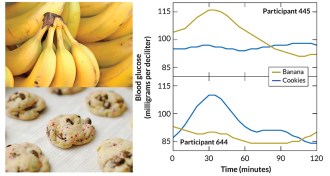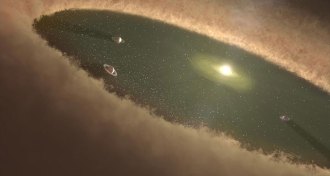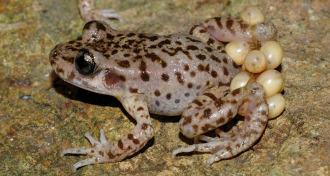Uncategorized
-
 Health & Medicine
Health & MedicineA good diet for you may be bad for me
Eating the same foods can produce very different reactions in people.
-
 Planetary Science
Planetary ScienceWay-out world is solar system’s most distant object — for now
An icy world over 15 billion kilometers from the sun is the new record holder for most distant object in the solar system.
-
 Animals
AnimalsGetting creative to cut methane from cows
Changing feed, giving vaccines and selective breeding may enable scientists to help beef and dairy cattle shake their title as one of society's worst methane producers.
By Laura Beil -
 Health & Medicine
Health & MedicineEngineered vocal cords show promise in animal tests
Lab-grown vocal cord tissue could lead the way to better treatments for people with vocal problems
-
 Planetary Science
Planetary ScienceGlimpse of baby planet shows what to expect when a star is expecting
A baby planet is still growing in the disk of gas that encircles a young star.
-
 Science & Society
Science & SocietyThe vagus is the nerve to know
The nervous system's meandering superhighway has the potential to lead researchers treatments for myriad health conditions.
By Eva Emerson -
 Planetary Science
Planetary ScienceBright minds, antineutrinos and more reader feedback
In the November 28, 2015, issue of Science News, readers discussed humanizing science, frog mating calls, antineurtrinos and Martian dust storms.
-
 Psychology
PsychologyCulture shapes sense of fairness
Culture shapes kids’ sense of fairness, especially when they get the short end of the stick.
By Bruce Bower -
 Animals
AnimalsPonds and their toads cured of dreaded disease
Treating both tadpoles and their ponds for infection by deadly Bd chytrid fungus lets midwife toads go wild again.
By Susan Milius -
 Health & Medicine
Health & MedicineWhen selenium is scarce, brain battles testes for it
In competition for selenium, testes draw the nutrient away from the brain.
-
 Plants
PlantsGenetic battle of the sexes plays out in cukes and melons
Genetics reveals new approach to preventing inbred seeds and encouraging more fruitful crops.
By Susan Milius -
 Plants
PlantsAncient gardeners saved the gourd
Domestication might have helped early vine plants like pumpkin survive after seed-dispersing megafauna went extinct.